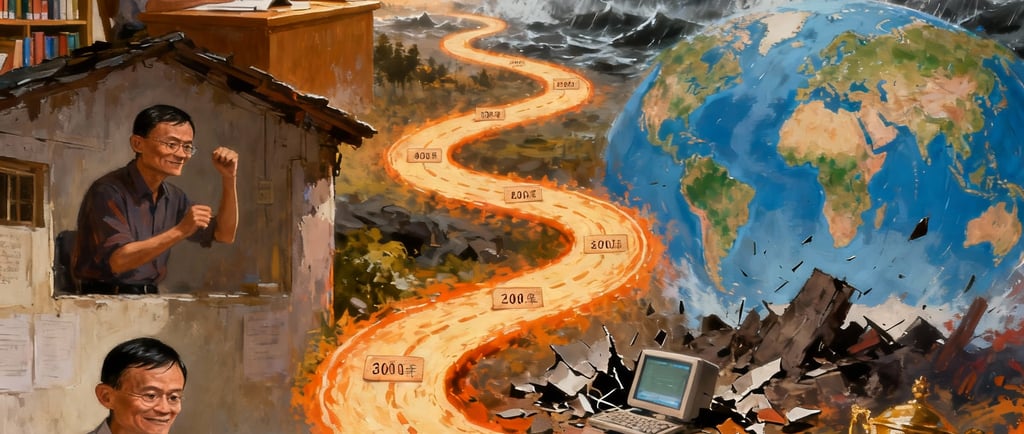
Jack Ma
From $12 Teacher to Billionaire
Shane Brown
9/24/20253 min read


Jack Ma: From $12 Teacher to Billionaire
Most people would quit after the first few rejections. Jack Ma faced hundreds. Today, he's worth $28 billion and built one of the world's largest companies. His story proves that failure isn't the opposite of success. It's the foundation.
The Rejection Collection
Jack Ma failed at everything first. He bombed his college entrance exam three times. Got rejected from 30 jobs in a row. KFC hired 23 out of 24 applicants. Guess who didn't make the cut?
Harvard Business School said no ten times. Ten. Most people would get the hint after two or three rejections. Ma kept applying.
The police force turned him down too. They told him he was "no good." Looking back, they probably saved him from a life of mediocrity.
The $12 Starting Point
Eventually, Ma landed a job teaching English at a local university. His monthly salary? Twelve dollars. That's less than what most people spend on lunch.
But here's the thing. Ma later said those were the happiest years of his life. While everyone else was chasing money, he was building something more valuable. Communication skills. Understanding people. Patience.
These skills would later help him explain complex internet concepts to confused Chinese businesses. Sometimes what looks like a setback is actually preparation.
The Internet Moment
In 1995, Ma visited Seattle for the first time. A friend showed him this gray box with a screen. Ma thought it looked like military equipment.
Then his friend demonstrated the internet. Ma searched for "beer" and found results. He searched for "China" and found nothing. Zero Chinese content online.
Most people would shrug and move on. Ma saw opportunity. He realized the internet would change everything. More importantly, he saw that China was completely missing from this revolution.
Building Something From Nothing
Ma borrowed $2,000 from friends and family to start China Pages in 1995. Within hours of launching, Chinese investors were calling. The website generated $800,000 in three years.
But Ma lost control of the company in a joint venture gone wrong. Another failure. Another lesson.
In February 1999, Ma gathered 18 friends in his tiny apartment. No fancy office. No venture capital. Just a vision and people who believed in him.
They called it Alibaba. The name came from the story of Ali Baba and the forty thieves. Ma wanted to unlock treasures for small businesses.
The Five-Minute Decision
The breakthrough came through Masayoshi Son, CEO of SoftBank. Son was known for quick decisions, but this was extreme. He offered Ma $40 million after talking for just five minutes.
Son's reasoning? "He had no business plan, zero revenue. But his eyes were very strong. He has charisma, leadership."
Ma only took $20 million. He thought that was enough. Most entrepreneurs would grab everything available. Ma knew his limits.
The Empire Emerges
Alibaba launched Taobao in 2003 and drove eBay out of China. They understood local needs better than the American giant.
The company went public in 2014 with the largest IPO in history. $25 billion raised. Ma became China's richest person overnight.
Today, Alibaba generates over $130 billion in annual revenue. It's not just e-commerce anymore. Cloud computing, digital payments, logistics, entertainment. A complete ecosystem.
What You Should Learn
Ma's story isn't about luck or being in the right place at the right time. It's about persistence with purpose. Here are the key lessons:
Failure is feedback. Ma treated each rejection as education, not defeat. He said, "Make enough mistakes and fail." Each no brought him closer to yes.
People matter more than technology. Ma succeeded because he understood human needs, not because he was a coding genius. His teaching background helped him communicate complex ideas simply.
Vision beats resources. Ma didn't need the best credentials or unlimited funding. He needed a clear picture of the future and the determination to build it.
Timing isn't everything, but preparation is. When the internet opportunity appeared, Ma was ready. Years of rejection had built his resilience. His teaching experience had developed his communication skills.
The distance between $12 a month and $28 billion isn't measured in money. It's measured in persistence. Every rejection was just practice for the next opportunity.
Ma proved that your starting point doesn't determine your destination. Your response to setbacks does.
